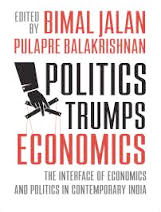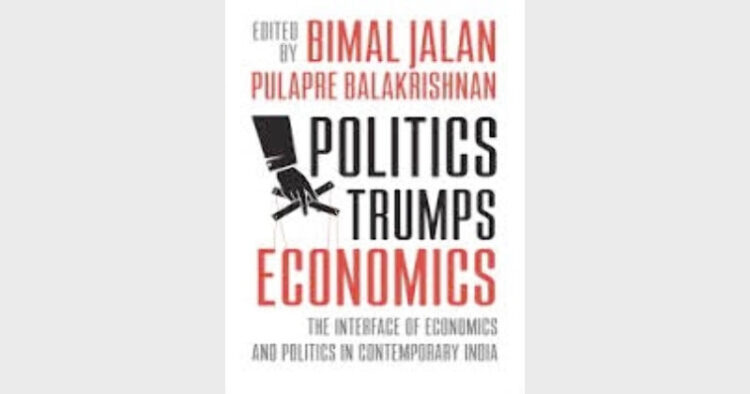 Politics Trumps Economics: The Interface of Economics and Politics in Contemporary India, Bimal Jalan & Pulapre Balakrishnan (Eds.), Rupa Publications India Pvt. Ltd, Pp 212, Rs 500.00 ? Politics Trumps Economics: The Interface of Economics and Politics in Contemporary India, Bimal Jalan & Pulapre Balakrishnan (Eds.), Rupa Publications India Pvt. Ltd, Pp 212, Rs 500.00 ? |
Intro: Twelve essays in the book makes us ponder over the constraints and stumbling blocks that prevents growth in Bharat.
?
In this compilation of articles by experts in the field of politics and economics, editor Bimal Jalan, who has served as Reserve Bank Governor in the past, have discussed in detail the reasons responsible for the increasing disparity among the people in India.
Meghnad Desai, Emeritus Professor of Economics at the Indian School of Economics, emphasises the importance of social equity as a dimension of inclusive development. He speaks of the Nehruvian development paradigm where benefits did not accrue to the lover strata of society and how the subsequent Mandalisation helped the lower jatis to use the ballot box to alleviate their social status. However, despite all this, the issues of governance by their leaders were not addressed through larger investments in human capital like health and education, hence, the status quo of social inequity.
Dipankar Gupta, former Professor at JNU, says that “politics now trumps economics” on the streets and squares of India as displayed by “the anti-corruption movement of 2011, the unrest in the aftermath of the brutal rape in December 2012 and closer up, the rise of the Aam Aadmi Party in 2014”, all of which were prompted by the call of citizenship. Poonam Gupta of World Bank highlights the fact that the electorate is intelligent enough to discern the economic performance of the states and vote accordingly. This is quite contrary to politicians who try a “politics first agenda”.
Ashima Goyal, Professor at IGIDR, Mumbai, says that India started out with highly intensive political institutions which fostered populist schemes instead of delivering better governance. Nevertheless she is hopeful that with liberalising reforms and improved systems and incentives, the county may do even better than China.
Samuel Paul, founder of Public Affairs Centre at Bengaluru, suggests anti-corruption reforms for changes in multiple dimensions of governance, like policy making, regulatory systems, organisational structures,etc.
TT Ram Mohan, Professor of Finance and Economics at IIM, Ahmedabad, discusses evils like corporate governance and its all-pervasive evils, the unreliability of accounts (as seen in the Satyam case), ineffective corporate boards, dictatorial CEOs and the high executive salaries that are considered incentives, regardless of their company’s performance responsible for social inequity.
P Balakrishnan expresses his regrets over the failure of policy planners to realise the importance of boosting agriculture productivity and domestic markets as part of the inclusion policy
Ravi Kalur, T H Lee Professor of World Affairs at Cornell University, points to the association of informality with poverty and low productivity and rejects the argument that informality is caused by excessive regulations in the formal sector .
Sunil Mani, Professor at the Centre for Development Studies, Thiruvananthapuram, says that while technological development showed high rates of economic growth in Korea and Taiwan, but in India, despite its Five-Year Plans meant for achieving self-reliance, in the last three years, adoption of constructive policies with lackadaisical implementation has made India more dependent on foreign technological inputs than ever before.
M Govinda Rao of Finance Commission says that policies relating to public finance can play an important role in accelerating growth.He suggests observation of fiscal discipline at the Centre as an alternative.
Deepak Mohanty of Reserve Bank of India discusses the objectives, framework and implantation of monetary policy in India and lauds the constructive role played by the bank in maintaining financial stability.
To put it in brief, the 12 essays makes us ponder over the constraints and stumbling blocks that prevent elimination of poverty, and help embark on a path of sustained inclusive growth.
Manju Gupta ( The reviewer is former editor of NBT )?














Comments